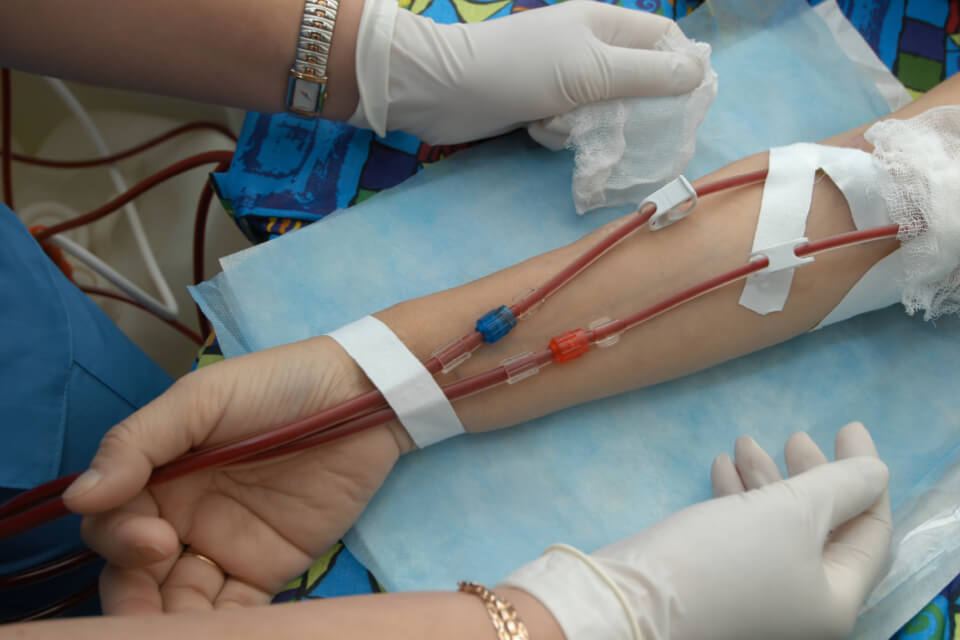What to Know
Sometimes those receiving kidney hemodialysis treatments via an arteriovenous (AV) fistula or graft (a connection made between an artery and vein for dialysis access) experience problems. When problems with a fistula occur, a dialysis fistulogram needs to be performed to treat the issue to keep the fistula functioning at its best.
Know the Signs
A dialysis fistulogram is a procedure performed by the skilled physicians at Richmond Vascular Center to identify areas in the fistula that may be blocked, enlarged, or narrowed. Contact us if you have concerns or experience any of the following problems:
- Difficulty accessing the fistula / graft
- Prolonged bleeding
- High arterial or venous pressures during dialysis
- Diminished bruit or thrill (diminished flow) of the fistula / graft
- Occluded fistula
- Non mature fistula- newly created fistula that does not have sufficient blood flow for dialysis
What to Expect
The procedure is minimally invasive - performed through one or two incisions no larger than 2-3 mm. The findings will determine whether an additional intervention, performed at that time, is necessary to restore blood flow needed for successful dialysis treatments. Majority of fistulograms are completed within less than one hour, depending on the intervention needed.
During a dialysis fistulogram, your access site is cleaned with a sterile cleaning solution, draped with sterile sheets, and the site where the physician will access your fistula is numbed. From there, the physician injects X-ray dye through a small tube known as a catheter into the fistula or graft. X-rays are taken to identify abnormalities. The most common abnormality is related to the development of a narrowing, called a stenosis, that limits the blood flow in the fistula. If a narrowing is identified, then a small balloon is then inserted into the fistula and guided to the narrowed area. The balloon is inflated to open up the narrowed area of the fistula, deflated, and then removed. This treatment is called balloon angioplasty/venoplasty. If the narrowing does not respond to the balloon treatment, then the physician may need to place a stent in the fistula to help keep the fistula open to ensure optimal flow.
After 24 hours, you may return to your usual activities. Before then, follow these guidelines for post dialysis fistulogram care.
- If you received medication, do not drive, use heavy machinery, make legal or financial decisions, sign important documents, drink alcohol, or take sedation medications
- Do not lift anything heavier than a two-liter bottle of soda.
- Do not wear clothing that will press against your wound.
- Relax. Do not do anything stressful.
- You may eat and drink as usual.
Sharing knowledge. Empowering Patients.
How should I prepare for my dialysis fistulogram?
Prior to a dialysis fistulogram, arrange for a responsible adult to accompany you to your procedure, stay during your procedure, and drive you home. The procedure may require administration of medication that will keep you comfortable during the procedure but could impair your ability to drive after the procedure is completed.
What should I expect after the procedure?
It is normal to experience mild tenderness, swelling, and bruising at your puncture site. While complications for dialysis fistulograms are rare, consult your doctor immediately if you experience redness or swelling around the puncture site, warmth around the puncture site, drainage from the puncture site or a lack of pulse or weak pulse in the fistula or graft.
Will I have stitches? If so, when will they be removed?
Most patients do not require stitches, although they are sometimes necessary. If you do need stitches, you will return to Richmond Vascular Center to have them removed.
Will my insurance cover both the diagnostic tests and procedures done in the outpatient setting?
Yes. At Richmond Vascular Center, our patient-focused staff is committed to ensuring the completion of all referrals and authorizations prior to your initial visit.
placeholder

RVC was awesome! I had my dialysis catheter removed and it was a piece of cake! The staff is outstanding, and I will be happy to do my follow up visits there.


